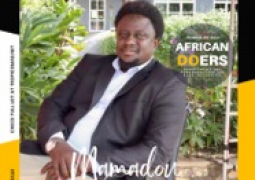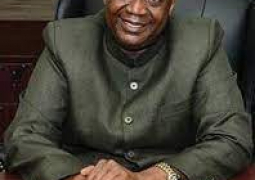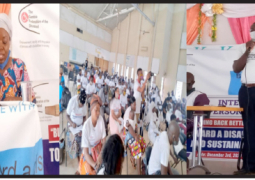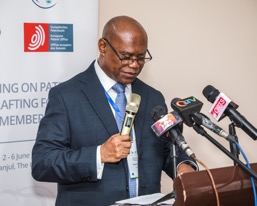
Held at the Ocean Bay Hotel in Banjul, the event brought together legal and technical experts from across the continent under the banner of the Intellectual Property Rights and Innovation in Africa (AfrIPI) project, a joint EU-EUIPO initiative. The training marks a critical step toward advancing patent capacity, protecting innovation, and fostering a knowledge-based economy across Africa.
The five-day Activity 9 Patent Drafting Training hosted in Banjul was officially opened by The Gambia’s Solicitor General at the Ministry of Justice. The seminar is a significant initiative under Component II of the AfrIPI 2024/25 Annual Work Plan, aimed at strengthening national and regional intellectual property (IP) institutions, networks, and enforcement mechanisms across the African continent.
AfrIPI, the Intellectual Property Rights and Innovation in Africa project, is a collaborative action initiated by the European Union (represented by the European Commission) and the European Union Intellectual Property Office (EUIPO).
It was established under the Intellectual Property Rights Action for Africa, guided by a contribution agreement (PANAF 2019/411-141) signed in December 2019 and amended in 2020 to extend its timeline and increase financial contributions.
ARIPO the African Regional Intellectual Property Organization currently consists of 22 Member States including The Gambia, Botswana, Ghana, Kenya, Nigeria, and others. AfrIPI was launched on 1 September 2020 for an initial period of 48 months, later extended to 60 months.
The project’s main goal is to facilitate intra-African trade and promote African-European investment by enabling the creation, protection, and enforcement of intellectual property rights in alignment with the African Continental Free Trade Area (AfCFTA) and the African Union’s Agenda 2063.
Due to a chronic shortage of skilled patent examiners in the ARIPO region, ARIPO has taken up the role of offering search and examination services on behalf of its member states. Though national laws empower local authorities to handle such responsibilities, most countries still lack the capacity to perform high-quality patent searches and examinations efficiently.
To address this gap, ARIPO, in collaboration with the European Patent Office (EPO) and AfrIPI, launched the ARPET Programme in 2021. This program provides a competency-based training framework for patent examiners in ARIPO Member States, Angola, and Ethiopia.
During the opening session, Ms. Aida Galindo Ortiz, the Project Leader of the Intellectual Property Organisation, highlighted the significance of the training as it entered its final, in-person phase following an earlier virtual segment. She lauded the dedication and perseverance of the participants who completed the online phase, noting that their successful engagement demonstrated the seriousness with which they approached this opportunity.
“Today marks a significant milestone,” she stated, “as the patent drafting and prosecution training we convened for has entered its final phase after a fast-paced online segment. I wish to congratulate all participants present for their commitment and discipline in successfully completing the online portion.”
Ortiz emphasized that this training is a vital component of AfrIPI’s objective to build technical capacity, improve patent drafting skills, and strengthen Africa’s intellectual property framework. She noted that a more robust IP system would empower local innovators to transform their ideas into protected, commercially viable assets, enhancing their ability to compete in international markets.
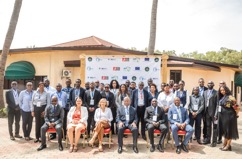
She also proposed the creation of a peer-to-peer accountability and monitoring network among the trainees, facilitated through ARIPO’s existing structures. Such a network, she explained, would allow participants to continue exchanging best practices, refine their knowledge, and sustain the momentum of the training. Additionally, she advocated for stronger engagement with innovation incubators and hubs, enabling the trainees to gain hands-on experience by interacting with real-world patent cases.
“Whatever strategies we adopt going forward must be implemented with conviction,” she remarked. “With strategic funding, structured engagement, and institutional support, this training has the potential to evolve into a transformative, continent-wide initiative that positions Africa for success in the global innovation ecosystem.”
Ms. Enrica Pellacani, Head of Cooperation at the European Union Delegation to The Gambia, delivered remarks on behalf of the EU Ambassador, H.E. Immaculada Roca Cortés. She affirmed the EU’s long-standing commitment to building African capacities in key development sectors and underscored that enhancing patent skills aligns closely with the EU’s strategic objectives in its global partnerships.
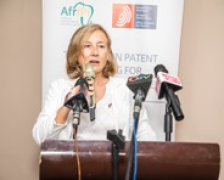
She specifically cited the EU Global Gateway Strategy, which aims to channel €150 billion into sustainable and impactful investments across Africa. Implemented through Team Europe initiatives, the strategy fosters collaboration among EU institutions, member states, and financial organizations to deliver transformational projects in sectors such as health, agriculture, mining, infrastructure, and innovation.
“The Global Gateway’s Africa-Europe Investment Package reflects our desire for balanced and mutually beneficial economic cooperation,” she said. “This seminar fits well within our broader vision. Building patent capacity is not only timely it is foundational to Africa’s shift toward a knowledge-based economy.”
Pellacani stressed that by equipping African professionals with essential technical knowledge in patent drafting and prosecution, the training directly supports the continent’s aspirations for greater economic self-sufficiency, innovation, and global competitiveness.
In his remarks, Dr Outule Rapuleng of the African Regional Intellectual Property Organisation (ARIPO) expressed deep appreciation to AfrIPI, EPO, EUIPO, and the ARIPO Member States for their steadfast collaboration. He recalled the collaborative efforts dating back to 2023 that laid the groundwork for this world-class training initiative.
“We left no stone unturned in ensuring the best of European expertise was brought to bear in designing and delivering this program,” he said. “The training materials include rigorous quality control and are delivered by highly experienced and certified patent examiners.”
He extended special thanks to EPO President Mr António Campinos, represented at the event by a senior delegation, for the institution’s continuous support. Dr Rapuleng emphasized that the investment made in the participants’ attendance is an indication of the high priority attached to this training. He praised the participants for successfully navigating the online phase and encouraged them to now translate their learning into real-world impact.
“You have proven your commitment,” he told them. “You’ve demonstrated you have what it takes. Let the knowledge acquired here be a catalyst for change in your national systems and in the wider continent.”
Mr Nelson Das Neves from the European Patent Office thanked all stakeholders for their collaboration and encouraged trainees to maximize the opportunity, build networks, and apply their new skills to real-world innovations
Mr. Hussein Thomasi, Solicitor General and Legal Secretary at the Ministry of Justice, has emphasized the vital role of intellectual property (IP) in national development, noting that The Gambia is taking significant steps to modernize its IP landscape.
“Intellectual property is a cornerstone of sustainable economic growth,” Mr. Thomasi said. “In today’s global knowledge economy, the ability of a country to protect and leverage its intellectual assets is directly tied to its capacity to compete, create jobs, and deliver solutions to societal challenges. The Gambia fully recognizes this.”
He explained that the government has prioritized the development and modernization of the national IP system, adding, “Our commitment is clear: we will welcome and support every opportunity that enhances the protection, enforcement, and commercialization of IP rights in The Gambia.”
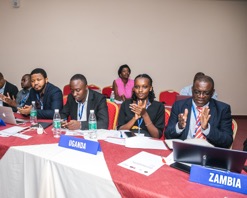
Speaking during a capacity-building training, Mr. Thomasi highlighted the value of such initiatives in strengthening the country’s IP framework. “This training is a prime example of such an opportunity,” he noted. “It represents not just the transfer of technical skills, but the laying of a foundation for a more resilient, knowledgeable, and empowered IP ecosystem in the African Region and The Gambia in particular.”
“As we build the skills of our professionals in patent drafting and prosecution, we are also building confidence in our system both for local innovators and for international collaborators,” he added.
Mr. Thomasi also revealed that The Gambia is currently in the process of enacting a new set of comprehensive intellectual property laws. “These reforms aim to bring our IP legal framework in line with international treaties, regional protocols, and global best practices,” he explained. “They will strengthen legal certainty, enhance investor confidence, and ensure that the rights of creators, inventors, and entrepreneurs are effectively protected.”
He concluded by underscoring the need for a holistic approach to IP development: “We believe that strong intellectual property protection must go hand-in-hand with continuous capacity building, enforcement, and public awareness. It must be inclusive, accessible, and geared toward enabling every Gambian especially our youth, our creators, and our research community to realize the full value of their ideas.”



